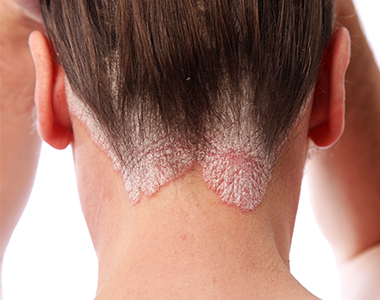Psoriasis
What is psoriasis?
Psoriasis is a condition in which the skin on some, or many, areas of the body becomes red, scaly and itchy. Around 2% of the population in Western countries are affected by psoriasis. It is not contagious and can affect both women and men.
Psoriasis sufferers also have a slightly higher risk of developing diabetes and cardiovascular disease, although once recognised, these can be managed through exercise and a healthy diet. Some may also develop a form of arthritis, called psoriatic arthritis.

What causes it?
Normal skin is constantly in the process of replacing the cells and structures of which it’s made. Psoriasis arises when the skin cells are replaced at an accelerated rate. Although the precise cause of psoriasis is unknown, there seems to be an autoimmune component, where the body’s own defence system malfunctions, as well as a genetic predisposition to the disorder.
Other suspected factors which may contribute to the development of psoriatic lesions can be episodes of stress, infection or trauma.
Psoriasis often comes and goes in unpredictable cycles of remission and flare-ups, making it an especially frustrating, chronic condition.
Symptoms and signs
Psoriasis takes the appearance of pink or red raised and itchy areas (plaques) on the skin, covered in silvery scales. In severe cases, the skin cracks and bleeds, forming a few or several lesions. Areas of the body most commonly affected include the scalp, elbows, knees and nails.
In severe cases affecting the scalp, the lesions are especially thickened and stick in chunks to the base of groups of hairs, a condition known as pityriasis amiantacea. In terms of differential diagnosis, seborrhoeic dermatitis should also be considered. Psoriatic lesions may also cause itching, and the combination of the lesions and scratching can result in the hair looking flattened and unhealthy.

In some cases there may be hair loss. This can be reversible but in rare cases severe disease can result in scarring alopecia, where there is permanent damage to the follicle.
Treatment
There is no cure for psoriasis, but there are treatments which can help to lessen its effects and repair the damaged skin, for example by moisturizing and softening the damaged areas. In mild cases, a tar-based or keratolytic shampoo is recommended.
For more severe cases, topical treatments such as calcipotriol lotion, betamethasone lotion, mometasone lotion or a combination of topical calcipotriol and betamethasone valerate can be applied.
Under the guidance of a dermatologist, other treatments that may be recommended include ultra-violet light therapy and systemic treatments, such as Methotrexate, which address the body’s autoimmune system.
Why see a trichologist?
A trichologist will be able to make or confirm a diagnosis of psoriasis, and will be able to give the patient information as to the prognosis of the condition, advice on treatments and what they should expect in the future.They will recommend that the patient see their GP and may also recommend referral to a dermatologist.
More facts
The Psoriasis Association is a UK charity which provides help and advice to sufferers, and which also funds research into the condition. www.psoriasis-association.org.uk
FAQ's
[otw-bm-list id=”19″]
Case Studies
[otw-bm-list id=”20″]